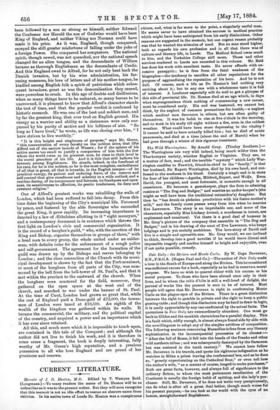Fair Italy : the Riviera and Monte Carlo. By W.
Cope Devereux, R.N., F.R.G.S. (Kegan Paul and Co.)—The author of Fair Italy made a tour in the South of Europe and along the Riviera. This be considered was sufficient excuse for a book, especially as he bad in reserve a moral purpose. We have no wish to quarrel either with his excuse or his moral purpose. To those who have been abroad once only in their lives, and to whom the table d'hige is still a well-head of delight, the perusal of works like the present is sure to be of interest. Most people will agree that Mr. Devereux is right in condemning Monte Carlo as the plague-spot of the Riviera. There is a great distinction between the right to gamble in private and the right to keep a publics gaming-table ; and though this distinction may be hard to draw in logic, it is easily appreciable by any one confronted by the actual facts. The quotations in Fair Italy are extraordinarily abundant. One must go back to Gildas and the monkish chroniclers for a parallel display. This is a fault which, oddly enough, is almost always found side by side with the unwillingness to adopt any of the simpler artifices of composition. The following sentence concerning Marseilles is free from any literary sophistication in the inconsequential procession of its clauses :— " After the fall of Rome, it fell into the hands of the Franks and other wild northern tribes ; and was subsequently destroyed by the Saracens, but was restored in the tenth century." We cannot here follow Mr. Devereux in his travels, and quote his righteous indignation as he watches in Milan a priest leaving the confessional box, and as he does so, "grossly expectorating on the Cathedral floor," or even tell how the author's wife, "as a matter of course, longed to make purchases." Both are great facts, however, and always full of significance to the ordinary Briton, to whom the most permanent recollection of the Continent is usually the foreign habit of spitting, and the lady's pur- chases. Still, Mr. Devereux, if be does not write very perspicuously, can do what is after all a great deal better, though much worse for his present purpose,—he can look at the world with the eyes of an honest, straightforward Englishman.


































 Previous page
Previous page